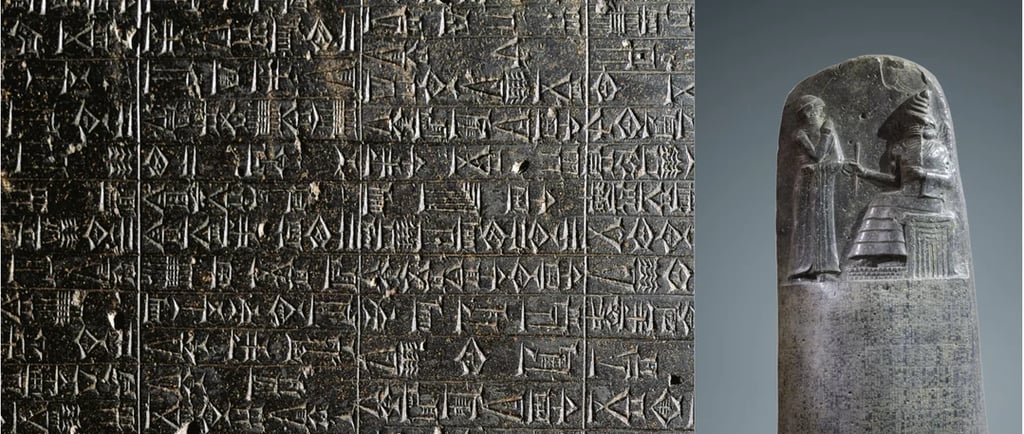🪨 The Stones of Justice: How King Hammurabi Governed Babylon ⚖️
The mighty city of Babylon and King Hammurabi, the ruler with a plan! 👑 Famous for creating one of the earliest sets of written laws, Hammurabi’s Code 📜The key for his successful governance! 🗝️
GEOGRAPHY STORIES
10/23/20243 min read


We’ve already discovered how governments help people live together in a community, making sure there are rules for everyone to follow. You might remember how we talked about governments needing laws to keep things fair and peaceful, just like in our homes and classrooms.
Well, today, we are going to travel back in time to one of the first great civilizations that ever created a government like this—Babylon, in the ancient land of Mesopotamia. 🌍 This civilization existed between two famous rivers you’ve heard of before, the Tigris and the Euphrates 🌊, the same rivers we discovered in the story of Language.
One of the most famous rulers of Babylon was King Hammurabi 👑. He ruled Babylon for 42 years, during a time when his city was at the height of its power. Hammurabi was a powerful and wise king who ruled over a large and busy empire 🌍. Hammurabi knew that to keep peace and order in his kingdom, he needed laws 📜. So, he created something very special: the Code of Hammurabi! This was one of the first sets of written laws in history 🖋️.
The laws were carved into tall stones 🪨 so that everyone in the kingdom could see them and follow them. These laws helped make sure that everyone was treated fairly ⚖️, and they covered everything from how to solve arguments to rules about farming and business. For example:
"Eye for an Eye": If someone hurt another person’s eye, they would lose their eye as punishment. Hammurabi wanted to make sure that people thought twice before hurting others!
Fair Treatment of Farmers: If someone’s animals wandered into a farmer’s field and ate all the crops, the owner of the animals would have to pay the farmer back for the damage. This helped protect the hard work of the farmers.
Helping Sick Animals: If a person took care of someone else’s animals, like cows or sheep, but didn’t look after them properly and they got sick or died, they had to replace the animals. This law made sure people treated animals with care.
If someone broke a law, there would be punishments 🛡️ to keep people from doing wrong again.
But Hammurabi didn’t rule alone! He had officials 🧑💼 who helped him collect taxes 💰 from the people to pay for things like building temples ⛪, canals for water 🚰, and walls to protect the city 🛡️. These officials also made sure that everyone in the kingdom followed the laws, and they helped King Hammurabi keep the kingdom running smoothly.
The government of Babylon was very organised. Each city in the kingdom had its own governor who made sure King Hammurabi’s laws were followed and that the people were safe and happy 😊. The priests ⛪ were also very important in the government because they took care of the temples and helped the people worship their gods.
The Code of Hammurabi was special because it was written on a tall stones for everyone to see 🧐. The laws were strict, but they made sure that people were treated fairly. Hammurabi wanted his people to live peacefully 🕊️ and follow the rules, Why do you think King Hammurabi wanted to carve the laws on stones for everyone to see?
Questions to wonder aloud :
What do you think it would have been like to live under the Code of Hammurabi? Do you think the laws were fair?
How do you think the officials helped King Hammurabi keep order in such a large empire?
Why was it important for the government to collect taxes? What kinds of things did they use the taxes for?
What would it have been like to be a governor in one of Babylon’s cities? What kinds of things would you have to do?
How do you think people felt about having laws carved in stone for everyone to see?
What do you think the role of the priests was in the Babylonian government? Why were they important?
If you lived in Ancient Babylon, would you rather be a farmer, a merchant, or a priest? Why?
You may want to create a poster with King Hammurabi laws?
What do you think we can learn from Hammurabi’s way of ruling? How is it similar to or different from governments today?
With Montessori joy,
Vanina 😊

